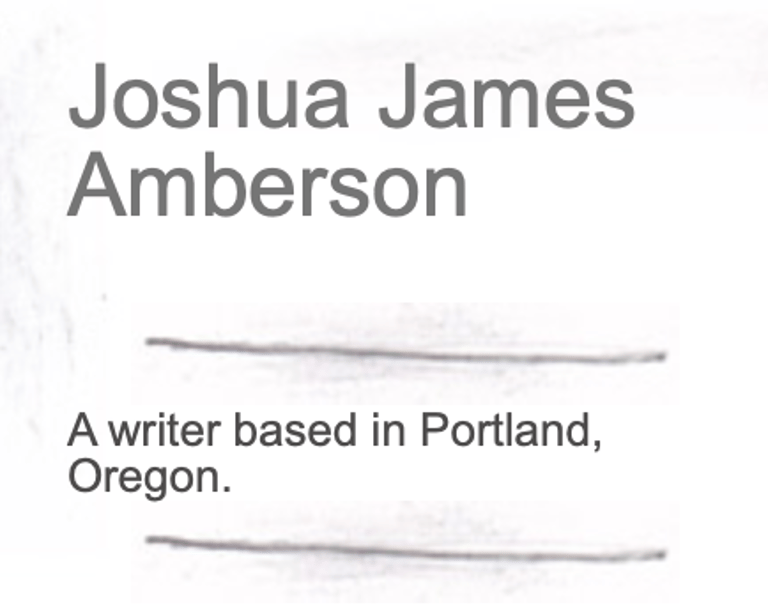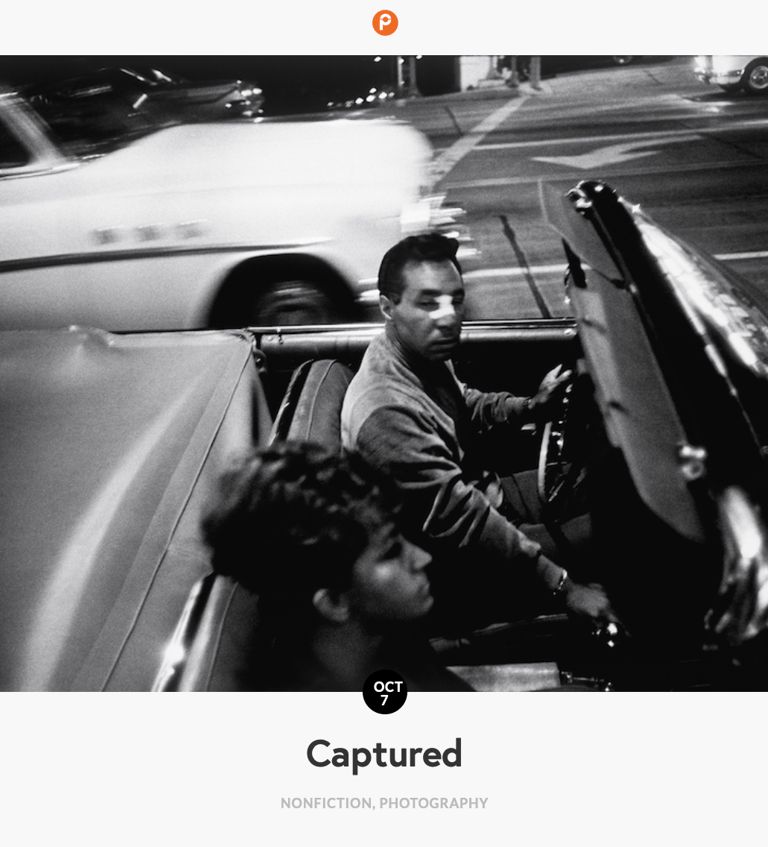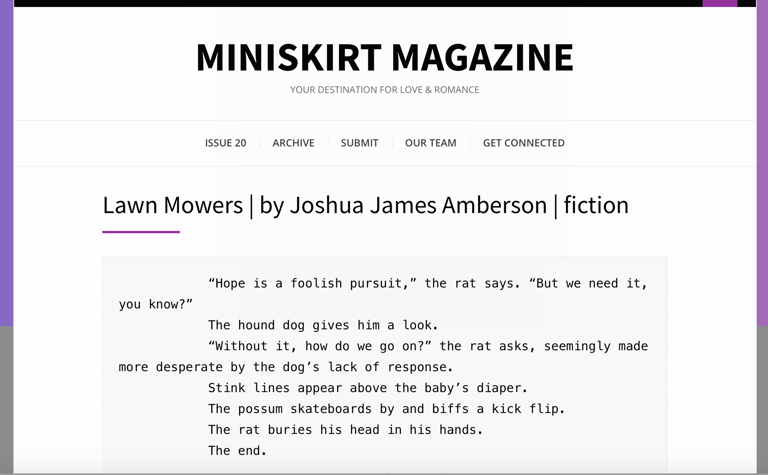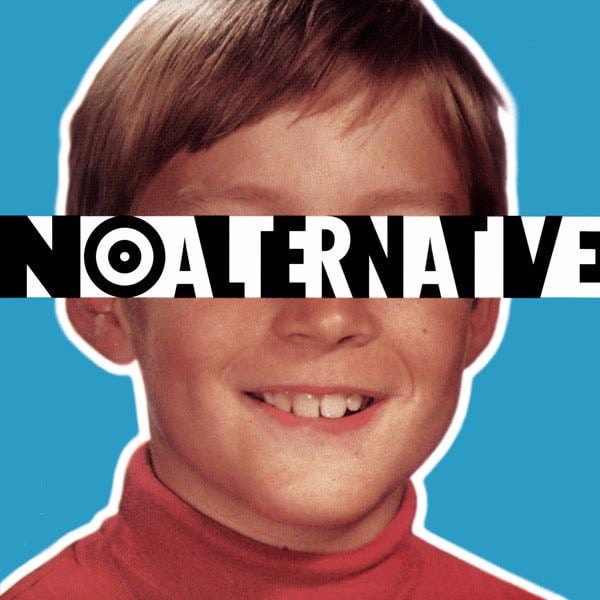As a prose writer, my essays, stories, and hybrid pieces have appeared in Tin House, Columbia Journal, Catapult, HAD, Vol. 1 Brooklyn, We’ll Never Have Paris, 1001, SUSAN: A Journal, Fiction Advocate, Alien Magazine, The Gravity of the Thing, 8-Track Mind, Srviv, Clock Tower Nine, The Rumpus, Used Records + Tapes, Eclectica Magazine, Bookstore Magic, Longreads, and the Stranged Writing anthology, among other publications.
As an arts-and-culture writer, my articles, reviews, and interviews have appeared in The Portland Mercury, Propeller, The Los Angeles Review of Books, The Seattle Times, The Rumpus, The Millions, Fiction Advocate, Maggot Brain, Performer Magazine, Behind the Zines, American Songwriter, Broken Pencil, Riot Fest, Zine World, and Electric Literature, among others. While some of these are only available in print, you can read over 100 past pieces online, many of which are linked over here.
(A few semi-recent pieces)
(Writerly facts)
Music Essay: No Alternative How it Felt to Believe in Alternative Rock (from Alive in the Nineties)
“It’s hard for me to believe now, and it feels almost ridiculous to say, but there was a time when I firmly believed in alternative rock. At least in the early years of the 1990s, I believed it held some key to life that I, at that point in my development—as a painfully shy, rural American, preteen white boy, living in a trailer in the Pacific Northwest—did not have. I believed that by loving it, I would create points of connection with other alternative music fans or learn ways to connect through the lyrics—lyrics written by songwriters who often seemed to feel a similar disconnection and shyness but had somehow learned to overcome it, at least enough to sing songs in front of other people. And by loving it, I would be loved.”
Personal Essay: Captured (from Propeller, collected in Staring Contest: Essays About Eyes)
“Photography is Sears portraits, gallery art, journalism, and porn. It’s a mountain range at sunrise, an abstract pattern on a body of water’s surface, a small rodent approaching extinction, a wool sweater on a handsome model. It’s bacteria on a petri dish, bodies at a crime scene, stars forming in the Eagle Nebula. It’s framed portraits on the mantle, old Life magazine special issues at the thrift store, dusty albums on the bookshelf, the head shots of aspiring actors, Instagram feeds, Facebook profiles, press photos. It’s weddings, graduation, and the first day of school.”
Artist Profile: I Am Nothing to Put to Rest: The Life and Legacy of Post-Punk Poet Lydia Tomkiw and Algebra Suicide (from Maggot Brain) (print-only)
“When a person is famous or legendary, we consider their entire lives up for grabs. We believe they trade in their privacy for popularity. But a performer who reveled in the attention, played a relatively small number of shows, read some poems, did a few interviews in small magazines, before fading into obscurity—what are the rules there? By doing this, was I just stirring up drama that had settled decades ago? Was I disrespecting the dead? The living? I went in thinking that I would simply be calling for Lydia’s work to be revisited, to bring a new generation to her. But the story is in the life and Lydia’s life was, like most interesting lives, messy. As I conducted interviews, I kept asking myself: Where’s the line between biographical fact and dirt, and how do I know when I’ve crossed it?”
Short Fiction: Lawn Mowers (from miniskirt magazine, collected in Slow Motion Heroics)
“She had dated a few rare guys over the years who seemed to like her almost solely because of Lawn Mowers. Each time this had seemed ideal in the beginning but had inevitably become uncomfortable. These men seemed to want an anecdote for later in life, when they’d settled down with someone who wasn’t her. Once, I dated an underground comic artist, she could hear them say. One of these men, in the days before their city’s alt-weekly had died, introduced her to everyone as ‘the girl who does the comic with the rat and the dog.’ She initially liked the pride he said it with, but it soon made her feel like she wasn’t a person but a comic in human form.“
Personal Essay: The Shape I Call Home (from Barren Magazine)
“Eventually I found the trailer could act as a stand-in for the times when I didn’t know the proper way—for the times where I could only listen to stories, not relate. I needed something, an excuse, so I wasn’t just ignorant or bad at things. In time that excuse became pride. It’s a common way out of shame—subvert expectations and turn it into pride—but it never fully makes shame disappear.”
Music Review: Selected Brief Music Blurbs (from The Portland Mercury)
"Remambran’s songs are worlds populated by sad Novas and weathervanes on fortresses. Worlds where both the presence of a persimmon tree and the absence of a Dairy Queen feel emotionally significant."
Book Review: Questioning Her Own Questioning: On Leslie Jamison’s Make It Scream, Make It Burn (from The Millions)
“It’s the ultimate essayist move: a writer questioning her own questioning; pushing against the act of pushing against. Though she never addresses where the boundaries of open-minded consideration lie, the essay’s bid for mystery and wonder feels exciting, almost ecstatic. It’s here that the book picks up speed and the collection’s larger themes come into focus: the limitations of doubt, how narrative and metaphor operate in our daily lives, and the universal need to believe in self-improvement.”
Personal Essay: A Childhood in Cars (published in Everyday Mythologies chapbook, and online through Longreads)
"He came over in a roughed-up minivan with his mom behind the wheel. A decade older than me, he looked haggard in a way that countered his boyish face. He shook my hand and briefly introduced himself before walking over to the car, whistling and kicking the tires, looking under the hood and rattling off a list of things he saw in there. This went on and on."
Book Review: We Were Tired of Being Mild: Reading Surrealist Post-Punk Poet Lydia Tomkiw (from Propeller)
“[S}peaking too seriously about Tomkiw’s work feels like something akin to an injustice. A big part of what makes her work so special is her particular brand of humor—dark and silly in equal measure, informal and down to earth—that often specifically pokes fun at taking things too seriously. My favorite lines of hers are written from the absurd and beautiful everyday mundanities of being alive. Lines like, ‘Then I dream the dream called laundry,’ or ‘Once, you stole music and it / Changed your whole life.‘”






